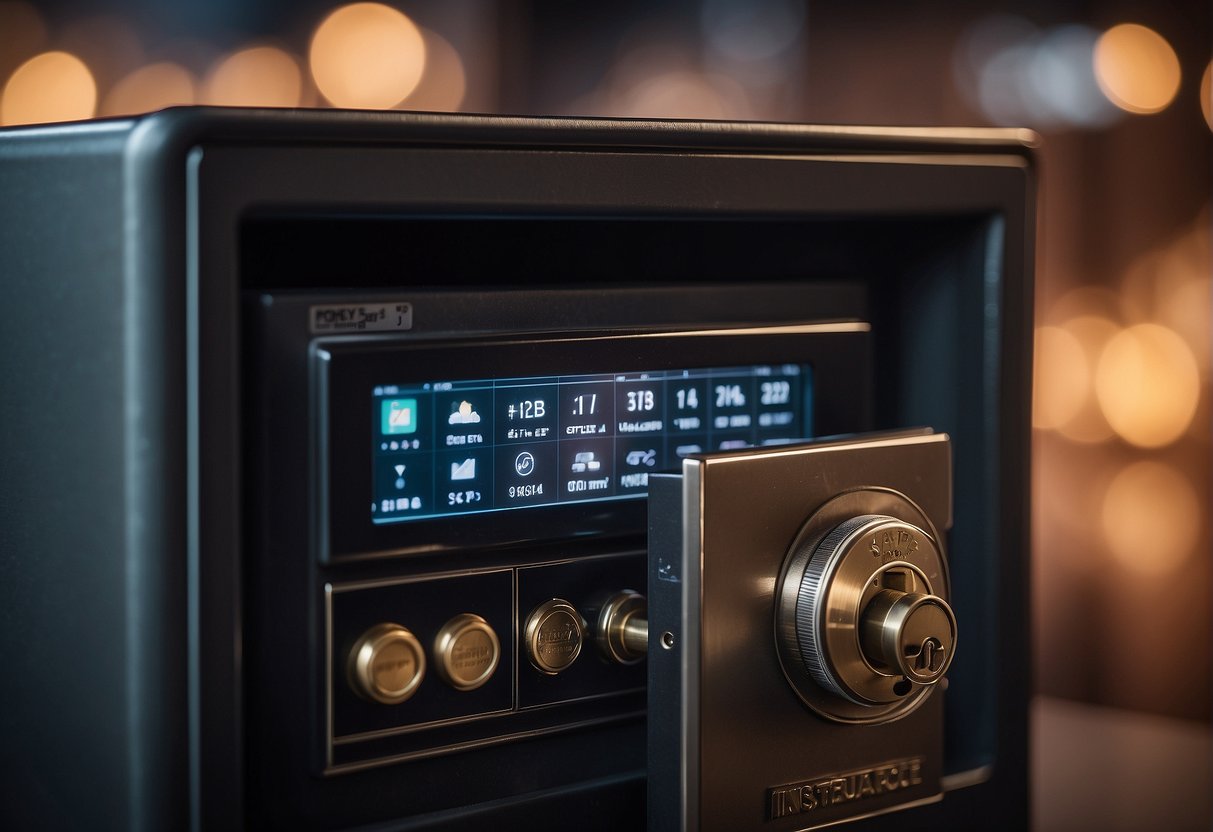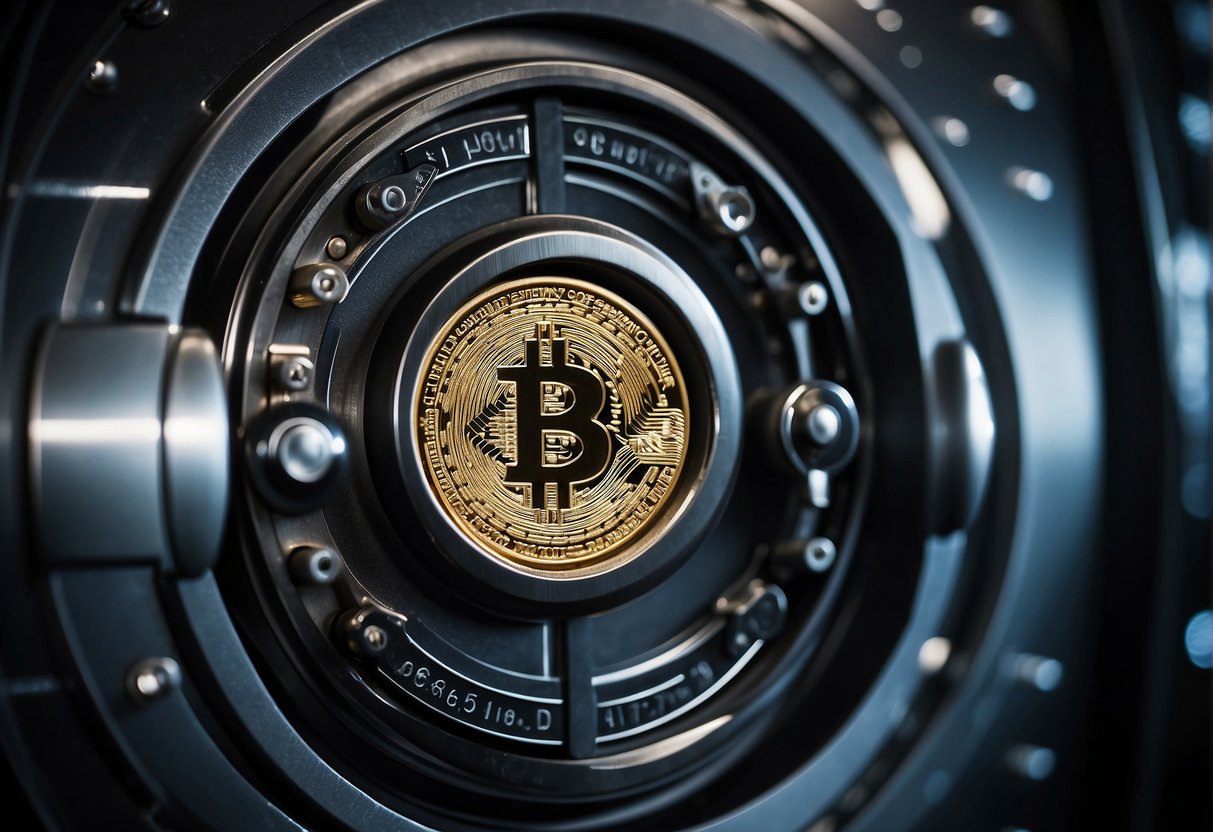In recent years, cryptocurrency investments have gained significant attention and popularity. However, with increased trading and investment activities, ensuring the security of digital assets has become necessary. The main concern for investors revolves around safeguarding and protecting their cryptocurrency from potential threats such as hackers, theft, and scams.

Secure storage is a crucial aspect of cryptocurrency investment. Digital assets like Bitcoin and Ethereum are stored in wallets that serve as a personal interface to interact with various blockchain networks. Depending on an individual’s requirements and preferences, these wallets come in several forms, each with advantages and unique security measures.
Choosing the right wallet and following best practices for backup, recovery, and protection policies can enhance the safety of cryptocurrency investments. Additionally, adhering to legal and regulatory requirements, dealing with reputed exchanges, and understanding transaction processes form the backbone of a robust investment strategy.
Key Takeaways
- Secure storage is essential for safeguarding cryptocurrency investments against potential threats.
- A wide range of wallet types is available, each with unique security measures and advantages.
- Combining best practices for backup and protection with sound investment strategies ensures the safety of digital assets.
Understanding Cryptocurrency Basics
What Is Cryptocurrency?
Cryptocurrency is a digital currency that uses cryptographic techniques to secure transactions and control the creation of new units. It operates on a decentralized network called a blockchain, a distributed ledger that records all transactions across a network of computers. One of the most well-known cryptocurrencies is Bitcoin, which was created in 2009 and has since gained widespread adoption and popularity.
Cryptocurrencies are rooted in removing the need for central authorities, such as banks and governments, to manage and control money flow. This allows for peer-to-peer transactions without intermediaries, lowering transaction fees and increasing privacy.
Types of Cryptocurrency
Thousands of cryptocurrencies are available today, each with unique features and use cases. Some of the most popular and widely recognized cryptocurrencies include:
- Bitcoin (BTC): The first cryptocurrency, invented by an unknown person or group under the pseudonym Satoshi Nakamoto. Bitcoin is often regarded as the “digital gold” due to its finite supply and growing adoption as a store of value.
- Ethereum (ETH): A blockchain platform that enables developing decentralized applications (dApps) and smart contracts. Ethereum’s native currency, Ether, pays for transactions and computational services on its network.
- Litecoin (LTC): Developed to address some of Bitcoin’s limitations, such as transaction speed and scalability. Litecoin offers faster transaction times and lower fees than Bitcoin but has a larger total supply of coins.
Many other cryptocurrencies exist, each catering to different aspects of the digital economy. Some focus on privacy, others on energy efficiency, and some are designed to facilitate micropayments, while others serve as the backbone for supply chain solutions.
Cryptocurrencies are digital currencies that leverage cryptography and blockchain technology to enable secure, decentralized transactions. There are multiple types of cryptocurrencies, each with unique features and use cases, such as Bitcoin and Ethereum. Understanding the basic concept of cryptocurrency and its different types is crucial for anyone considering investing or participating in the crypto market.
The Importance of Secure Storage
Risks of Crypto Investing
Investing in cryptocurrencies carries its own set of risks due to the digital nature of these assets. While the potential for high returns might be enticing, it’s essential to know that your investments could be stolen or lost if they are not protected adequately. Cybercriminals, such as hackers and bad actors, continuously target crypto investors to gain unauthorized access to their funds. Moreover, the crypto market’s decentralized and comparatively unregulated environment makes it susceptible to fraud and scams, leading to substantial financial losses.
Common Threats to Cryptocurrency Security
- Hacks: Cryptocurrency exchanges and wallets remain a prime target for hackers due to their vast holdings. Hackers can exploit vulnerabilities in platforms or devices that store crypto assets, leading to significant investor losses. Secure storage methods can help mitigate this risk.
- Phishing scams: Cybercriminals often use phishing scams to trick users into revealing sensitive information, such as login credentials or private keys. These scams can come from fraudulent emails, fake websites, or even social media messages that appear to be from legitimate entities.
- Bad actors: These individuals or groups use manipulation tactics, pump-and-dump schemes, or other illicit strategies to defraud investors and cause financial losses. Staying vigilant and informed about the crypto market’s latest trends and red flags can help prevent falling for such schemes.
- Losses due to user error: Cryptocurrency investors may also experience losses due to user error, such as accidentally sending funds to the wrong address, mismanaging private keys, or losing access to their wallet. Following best practices for managing and storing cryptocurrencies can minimize the probability of such errors.
To ensure the safety of your cryptocurrency investments, it is vital to understand the risks and common threats involved and to utilize secure storage methods like hardware wallets, wallet backups, and strong passwords. Educating yourself about the latest developments in blockchain technology and the security measures needed to safeguard your assets is essential in the rapidly evolving world of crypto investing.
Types of Crypto Wallets
When storing your cryptocurrency investments securely, it’s essential to understand the different types of wallets available. This section will discuss the main types of crypto wallets and their benefits.
Custodial vs Non-Custodial Wallets
A fundamental distinction among crypto wallets is whether they are custodial or non-custodial. Custodial wallets entrust a third party, usually a cryptocurrency exchange, responsible for securing your private keys. This type of wallet can be more user-friendly but has the drawback of potentially less control over your assets.
On the other hand, non-custodial wallets give users complete control over their private keys, storing them locally on the user’s device. This provides a higher level of security and control but also places more responsibility on the user to protect their keys. Non-custodial wallets include hardware wallets like Trezor and Ledger and software wallets like Metamask and MyEtherWallet.
Hot Wallets vs Cold Wallets
Another important distinction is between hot wallets and cold wallets. Hot wallets are connected to the internet, making them more accessible, convenient, and susceptible to potential hacks or security breaches. Hot wallets include mobile wallets like Guarda, web-based wallets, and desktop wallets when connected to the internet.
Cold wallets, also known as offline wallets, are not connected to the internet and provide higher security. Hardware wallets such as Trezor and Ledger are cold wallets that store your private keys offline. Another type of cold wallet is the paper wallet, which involves physically writing down or printing your private keys on paper.
To summarize, choosing the right type of wallet for your cryptocurrency investments depends on your security requirements, ease of use, and accessibility preferences. Custodial wallets may be more user-friendly, while non-custodial wallets provide greater control and security. Hot wallets offer convenience and easy access to your assets, whereas cold wallets are better suited for long-term storage and enhanced security.
Setting Up A Secure Wallet
Choosing the Right Wallet
There are various types of wallets to store your cryptocurrency investments securely. The most popular options are hardware, software, and mobile wallets. Hardware wallets such as Ledger and Trezor are physical devices that provide the highest level of security for your private keys. They keep your keys offline, reducing exposure to online threats. On the other hand, software wallets are applications that can be installed on your computer or smartphone. Although convenient, they might not be as secure as hardware wallets.
It’s crucial to research and select a wallet that best suits your specific needs based on factors like:
- Security features
- Ease of use
- Number of supported cryptocurrencies
- Compatibility with other devices.
Securing Your Private Keys
Protecting your private keys is critical to storing your cryptocurrency investments securely, regardless of the wallet type. Here are some essential guidelines to follow:
- Two-Factor Authentication (2FA): Enable 2FA on your wallet and exchange accounts. This extra layer of security ensures that even if someone gains access to your password, they still cannot access your account without the unique code provided by the 2FA method.
- Backup your wallet: Regularly back up your wallet, as it safeguards your investments from loss due to hardware failure or theft. Most wallets support seed phrases (BIP-39) for backing up your private keys, but other unique methods exist.
- Store backup securely: Write down your seed words or backup details on a piece of paper and store it in a safe location, such as a secure safe or a bank deposit box. Avoid storing digital backups that could be compromised.
- Use strong passwords: Create complex and unique passwords for your wallet and exchange accounts. A strong password is essential to protect against unauthorized access.
- Monitor wallet activity: Regularly check your wallet transactions and report any suspicious activity to your wallet provider or exchange.
Following these guidelines will help protect your private keys and ensure your cryptocurrency investments remain secure.
The Use of Cold Storage
Cold storage is a popular method for securing cryptocurrency investments due to its offline nature. With this approach, investors can safely preserve their digital assets in a physical wallet, minimizing the risks associated with online hacks and thefts.
Benefits of Cold Wallets
Cold wallets can be a beneficial security measure for cryptocurrency investors since they are not connected to the internet, offering protection against online threats. A cold storage device can reduce the risk of unauthorized access, hacking, and phishing attacks. In contrast to online wallets, which are vulnerable to security breaches, cold wallets provide a higher level of safety by safeguarding the private keys in an offline environment.
Some advantages of cold wallets include:
- Offline storage: Private keys are stored offline, minimizing exposure to hackers and other online threats.
- Physical control: Owners have complete control over their cold wallet, providing them more confidence in the security of their digital assets.
- Hardware compatibility: Many cold wallets are compatible with different types of hardware devices, giving investors various options for their storage solutions.
Creating a Paper or Hardware Wallet
There are two primary types of cold storage: paper wallets and hardware wallets. Both options aim to keep your cryptocurrency investments secure while ensuring easy access when needed.
Paper Wallets: A paper wallet is a physical document that securely stores the private and public keys required to access your cryptocurrency investments. To create a paper wallet, follow these steps:
- Generate private and public keys using a reputable online, predetermined generator or an offline essential generation tool.
- Print the keys on quality paper and laminate the document to protect it from water damage and wear and tear.
- Store the paper wallet in a secure, fireproof location, such as a safe or safety deposit box.
Hardware Wallets: A hardware wallet is a specialized, tamper-resistant device designed to store your cryptocurrency investments’ private keys securely. These wallets can be connected to a computer or mobile device to make transactions. To start using a hardware wallet, follow these steps:
- Purchase a reliable hardware wallet from a reputable manufacturer.
- Set up the wallet following the manufacturer’s instructions, which generally involves creating a unique PIN, passphrase, and backup seed phrase.
- Transfer your cryptocurrency investments to the hardware wallet’s address and disconnect the device to store it offline.
Overall, cold storage devices are essential for maintaining the security and integrity of your cryptocurrency investments. By selecting the right cold wallet type and taking adequate precautions, you can protect your digital assets from potential risks and ensure their safety for years.
Protecting Crypto with Hot Wallets

Securing Online Wallet Access
Hot wallets are cryptocurrency wallets that are connected to the internet, making them more accessible but also more vulnerable to cyberattacks. Users often choose hot wallets because they provide convenience, especially for frequent transactions. Popular hot wallet options include mobile wallets and web-based wallets.
To maintain robust security for your hot wallet, follow these best practices:
- Use strong, unique passwords: Create complex passwords that are difficult to guess, and avoid reusing them for multiple accounts. Consider using a reputable password manager to help manage your passwords.
- Enable two-factor authentication (2FA): Adding an extra layer of security through 2FA can significantly reduce the risk of unauthorized account access. Various 2FA methods include SMS codes, authenticator apps, and hardware tokens.
- Keep software up-to-date: Regularly updating your wallet software and device operating system can help protect against potential security vulnerabilities.
- Beware of phishing attacks: Always verify the website URL before entering sensitive information, and never click on suspicious links or attachments in emails.
Using Wallets on Exchanges
Storing cryptocurrency on an exchange may be convenient, especially if you trade frequently. However, it’s essential to understand the potential risks associated with using an exchange’s hot wallet.
Choose a reputable exchange: Opt for well-known and trusted exchanges like crypto.com or Coinbase when trading and storing your crypto assets. Research the exchange’s security measures, user reviews, and regulatory status before committing to an account.
Enable security features: Leverage the security settings provided by the exchange. Enable 2FA, use strong passwords, and set up withdrawal address allowlisting to limit the locations to which your assets can be sent.
Monitor your account activity: Monitor your account activity and set up notifications for logins or transactions. This will help you detect any suspicious activity and take appropriate action if necessary.
Diversify storage: Consider dividing your assets between multiple wallets and storage methods if you have many cryptocurrencies. This will lessen the risk of losing your entire investment in case of a security breach at one location.
Remember, hot wallets are more susceptible to cyber threats, so it is crucial to prioritize security when storing your cryptocurrency investments online. By following the guidelines outlined above, you can enhance the protection of your crypto assets in both online wallets and exchanges.
Backup and Recovery Methods
Creating a Recovery Plan
A well-thought-out recovery plan is essential for securely storing your cryptocurrency investments. To create a robust recovery plan, you should identify potential threats, such as losing your devices or passwords, and devise strategies to mitigate each risk. Make sure to have redundant and geographically diverse storage locations for your backups. Consider using physical and digital backups to counter theft or hardware failure risks.
One popular approach is storing multiple backup copies in secure cold storage solutions. Cold storage refers to disconnected hardware devices, like USB drives or specialized crypto wallets. These will keep your private keys and seed phrases offline, reducing the dangers of remote attacks or hacking.
Using Seed Phrases and Backups
A seed phrase, or a recovery phrase, is a sequence of words that can be used to recover your cryptocurrency investments in case of wallet failure or loss. Seed phrases are a secure backup for your wallet’s private key and should be confidential. Avoid storing your seed phrase digitally (e.g., in emails or cloud storage), and opt for physical copies (e.g., paper or metal).
When it comes to backing up your seed phrase, consider the following best practices:
- The seed phrase is: Use permanent ink on acid-free paper or metal sheets that resist fire, water, and corrosion. Store this secure object in a safe place like a bank safety deposit box, a personal safe, or at least a securely locked drawer.
- Split the seed phrase: CRarely, people split the seed phrase into separate parts and store them in different locations. By doing so, even if one part gets compromised, your investments remain safe. However, this method increases the complexity of the recovery process and might not be suitable for everyone.
- Multiple copies: Keep numerous backups of your seed phrase in geographically diverse locations, ensuring that the loss or damage of one backup doesn’t make recovery impossible.
Remember, your seed phrase is the key to your cryptocurrency investments. Please treat it carefully and take the necessary precautions to ensure your investments remain safe and secure.
Securing Your Investment Strategy

Balancing Portfolio and Security
When investing in cryptocurrencies, balancing portfolio growth and security is essential. First and foremost, investors should only keep their cryptocurrencies on an exchange if they are actively trading them. Otherwise, it’s advisable to transfer funds to an external wallet, as recommended by Security.org.
Consider splitting your holdings into multiple wallets or storage solutions to diversify risk. This will mitigate the extent of potential damages in the event of a security breach or hacking.
Furthermore, always enable two-factor authentication (2FA) when using crypto platforms to enhance security, as suggested by Coinbase.
Long-Term Storage Solutions
Consider using cold storage options like hardware or paper wallets for long-term storage. Hardware wallets are physical devices that keep your private keys secure and offline, reducing the risk of online threats. Examples of reputable hardware wallets include Trezor and Ledger.
On the other hand, paper wallets also provide a highly secure method for storing cryptocurrencies. It involves printing your private keys on paper and keeping it safe from theft, fire, or water damage.
Another option would be to explore multi-signature wallets. These wallets require more than one private key to access and transfer funds, adding an extra layer of security to your investments.
In summary, a proactive approach to safeguarding cryptocurrency investments is critical to success in this market. Research different storage methods and employ security measures to secure your digital wealth.
Advanced Security Measures

Understanding Multi-Signature Wallets
Multi-signature wallets are a type of cryptocurrency wallet that adds an extra layer of security to the storage of digital assets. These wallets require multiple private keys for authorization, significantly decreasing the chances of unauthorized access. In a typical multi-signature wallet setup, there are numerous vital holders, and a certain number must approve a transaction before it can be executed. This feature is commonly used by organizations or individuals who want to maintain higher control and security over their funds.
A simple example of a multi-signature wallet configuration has 2-of-3 keys, where any 2 out of the three private keys are required to authorize a transaction. This setup helps avoid single points of failure, ensuring the funds remain secure even if one key is compromised. Using hardware wallets for storing private keys associated with multi-signature wallets can significantly improve the security of your cryptocurrency investments.
Employing Two-Factor Authentication
Another essential security measure to consider when storing cryptocurrency investments securely is using two-factor authentication (2FA). 2FA adds a layer of verification to the user authentication process, requiring a unique code or physical token and the standard username and password. This second layer of authentication can significantly reduce the chances of unauthorized access to your wallet or exchange account.
There are various types of 2FA methods available today, including:
- SMS authentication: Receiving a unique code via text message after entering your password.
- Authenticator apps: Using a dedicated application, such as Google Authenticator or Authy, that generates a time-sensitive code when the user tries to log in.
- Hardware tokens: Carrying a physical device, such as a YubiKey, that generates a unique code and must be physically present during the login process.
Enabling 2FA on your cryptocurrency wallet and exchange accounts is highly recommended to protect your funds from malicious actors. Although it may add some inconvenience to the login process, the benefits of increased security greatly outweigh the minor inconvenience. Utilizing multi-signature wallets and two-factor authentication can provide an effective and comprehensive security strategy for cryptocurrency investments.
Insurance and Protection Policies

Exploring Insurance Options
In the world of cryptocurrencies, securing your investments is crucial. One way to protect your assets is by exploring insurance options. There is a growing market for crypto-insurance, protecting against losses from cybersecurity breaches or theft. Ideally, investors should look for policies that cover both hot and cold wallets and offer various coverage levels depending on the investment’s value.
Not all insurers offer cryptocurrency policies, but some prominent players, like Lloyd’s, have entered the market through partnerships with crypto insurance firms. Researching different providers and comparing their offerings is highly recommended to determine the best policy fitting your security needs.
Importance of a Trusted Custodian
Aside from insurance, working with a trusted custodian is essential. A custodian is a third party responsible for safeguarding your digital assets. These entities often provide additional security measures to reduce the chances of hacks and theft.
While some crypto exchanges offer custodial services, others may not provide the same level of security, putting your assets at risk. Investors should consider storing their cryptocurrencies either with a well-established custodian or in a cold wallet – which refers to an offline storage solution for maximum protection.
By ensuring that your investments are stored with a reliable custodian and have an insurance policy in place, you create a robust security network for your digital assets. This approach can minimize the risks associated with cryptocurrency investments and give you peace of mind.
Legal and Regulatory Considerations

Understanding Crypto Regulations
In the ever-evolving world of cryptocurrencies, staying informed about the legal and regulatory landscape is essential. Across various jurisdictions, the treatment and classification of cryptocurrencies differ significantly. The Securities and Exchange Commission (SEC) plays a significant role in regulating digital assets in the United States. Investors and businesses must understand and adhere to the SEC’s guidelines and requirements.
As the crypto market develops, regulatory bodies like the SEC constantly review their stance on digital assets. Some aspects to consider when dealing with cryptocurrencies include:
- Legal classification: Depending on jurisdiction, cryptocurrencies may be classified differently, such as property, commodities, or securities.
- Tax implications: The treatment of crypto gains for tax purposes varies by country, with some requiring capital gains reporting.
- Anti-money laundering (AML): Governments and regulatory bodies have implemented AML policies and measures to prevent illicit activities involving cryptocurrencies.
- Know Your Customer (KYC): Many countries enforce strict KYC regulations on cryptocurrency platforms, ensuring that identity verification is carried out for all users.
Operating Within Legal Boundaries
To store cryptocurrency investments securely, operating within the legal boundaries set forth by your local jurisdiction and regulatory agencies is crucial. Working with reputable platforms and services that comply with relevant regulations, such as Chainalysis, can help mitigate potential risks and legal consequences.
Here are a few steps to enhance security while maintaining regulatory compliance:
- Choose a secure cryptocurrency exchange: Ensure the exchange supports a wide range of cryptos, has a user-friendly interface, and follows the necessary regulations in your country (Investopedia).
- Use an external wallet: Only keep cryptocurrency on an exchange if you are actively trading; otherwise, transfer your assets to an external wallet. Use two-factor authentication for added security (Security.org).
- Adopt AML and KYC measures: Work with platforms with strict AML and KYC policies. This helps you avoid potential legal issues while participating in the crypto market.
- Stay informed: Keep up-to-date with the latest legal developments concerning cryptocurrency in your jurisdiction, and consult with legal experts when necessary.
Considering these legal and regulatory aspects, you can securely store your cryptocurrency investments and minimize the risk of any legal complications in the future.
Dealing with Exchanges and Third-Parties

Choosing a Secure Exchange
When storing your cryptocurrency investments securely, selecting a reputable exchange is crucial. Many well-known exchanges, such as Coinbase, FTX, Kraken, and KuCoin, have extensive security measures to protect users’ funds.
As you consider exchanges, take note of the following features:
- Supported Cryptocurrencies: Ensure the exchange deals with the cryptos you’re interested in and others for potential future investments.
- Fees: Each exchange will have its fee structure, which can include trading fees, deposit and withdrawal fees, and conversion fees. Examine all these fees to determine the most cost-effective option for your investment.
- Security Features: Always choose an exchange that offers top-notch security features, such as two-factor authentication (2FA), cold storage, and wallet encryption.
- Geographic Limitations: Confirm that the exchange is supported in your country, as some platforms may have region-specific requirements or restrictions.
Managing Exchange Risks
Despite choosing a secure exchange, potential risks can arise when working with third-party platforms. To mitigate these risks, consider taking the following steps:
- Diversify your investments: Spread your investments across multiple exchanges, limiting the impact if any exchange faces issues or is compromised.
- Use personal wallets: Allocate some of your investments to individual wallets, such as hardware or mobile wallets. These wallets can provide higher security and control over your funds.
- Stay informed: Regularly monitor news and updates about your chosen exchange(s). Awareness of potential risks or security breaches may help you take timely action.
- Update security settings: Security is an ongoing process, and you should regularly review your account settings to ensure they align with best practices. Updating passwords and enabling new security features as they become available is essential.
By diligently selecting a secure exchange and actively managing the associated risks, you can improve the safety of your cryptocurrency investments.
Best Practices for Transactions

Sending and Receiving Crypto Safely
When dealing with cryptocurrency investments, ensuring that your transactions are as secure as possible is crucial. One way to achieve this is using a hardware wallet to store your crypto assets. These wallets are considered much safer than software or online wallets because they keep your private keys offline, which decreases the chances of hacking sources.
Here are some steps to follow when sending and receiving crypto assets:
- Always double-check the recipient’s address before initiating a transaction. Copy-and-pasting the address helps prevent errors.
- Use a wallet that offers two-factor authentication (2FA) to increase the security of your account.
- For more significant transactions, consider performing a test transaction with a small amount to ensure that you have the correct recipient address.
- Keep your wallet software and devices updated with the latest security patches. This helps in protecting your digital assets from possible vulnerabilities.
Detecting Red Flags in Transactions
Being vigilant and recognizing potential red flags in transactions can significantly lower the risk of losses in your crypto investments. Some common red flags to watch out for include:
- Phishing emails and messages: Scammers may trick you into revealing your wallet’s private keys or login credentials. Always verify the sender’s authenticity before clicking any links providing sensitive information.
- Unusually high transaction fees: Scammers can target crypto users by setting up fake exchanges or wallet services that charge exorbitant fees to steal from users. Research your chosen platform and compare their costs with industry standards sources.
- Guaranteed returns: Any platform or person promising guaranteed returns on crypto investments is likely not legitimate. Crypto markets are highly volatile, and no one can guarantee returns.
- Suspicious trading platforms: Before engaging in trading, conduct thorough research on various platforms to ensure they are trustworthy and secure. Look for user reviews and check if they have any regulatory oversight sources.
By following these best practices for transactions and looking for red flags, you can protect your cryptocurrency investments and minimize potential risks. Remember to remain cautious and stay informed about the ever-evolving landscape of cryptocurrencies and related security measures.
Frequently Asked Questions
What are the best practices for using a cold storage wallet to protect my crypto investments?
Cold storage wallets are the most secure way to store cryptocurrencies. Here are some best practices:
- Keep your private keys and seed phrases offline and stored safely.
- Don’t share your private keys or seed phrases with anyone.
- Always double-check the wallet address when sending or receiving funds.
- Use strong and unique passwords for your cold wallet devices.
- Regularly update the firmware of your cold storage device to ensure the latest security features.
Which crypto wallet is considered the safest for UK investors?
Investopedia’s list of the safest crypto wallets for UK investors can provide information on secure wallets. Some top options include hardware wallets like Ledger Nano X, Trezor Model T, and Keepkey. Always diligently and choose a wallet that fits your needs and security preferences.
What are the top 10 Bitcoin wallets recognized for their security features?
While the list may vary by expert opinion or individual needs, some of the top 10 Bitcoin wallets for security include:
- Ledger Nano X
- Trezor Model T
- Ledger Nano S
- Trezor One
- Keepkey
- Coldcard
- BitBox02
- Electrum (for desktop)
- Mycelium (for mobile)
- GreenAddress (for mobile)
Can you explain the process of storing cryptocurrency on a USB drive?
Storing cryptocurrency on a USB drive is a low-cost cold storage option. Here’s the process:
- Create a secure, encrypted USB drive using open-source software like VeraCrypt.
- Install an offline wallet compatible with your chosen cryptocurrency onto the encrypted USB drive.
- Generate a new wallet address and back up your private keys and seed phrases.
- Transfer your cryptocurrency to the newly created wallet address.
- Store the encrypted USB drive in a secure location, such as a safe or safety deposit box.
Note: This method may not be as secure as dedicated hardware wallets.
How do you ensure your cryptocurrency is safe from potential hacking incidents?
To keep your cryptocurrency investments safe from hacking, follow these tips:
- Use strong and unique passwords for all of your wallet and exchange accounts.
- Enable two-factor authentication (2FA) whenever possible.
- Be cautious of phishing emails and websites; never enter your credentials on suspicious sites.
- Store your cryptocurrencies in cold storage wallets, such as hardware wallets, rather than online exchanges.
- Regularly update your wallet software and firmware to maintain security features.
What are the risks of storing cryptocurrency in online exchanges, and where should I keep it instead?
Storing cryptocurrency in online exchanges exposes you to:
- Hacking and theft: Exchanges can be vulnerable to cyberattacks, leading to loss of funds.
- Exchange insolvency: If the exchange goes bankrupt, your funds may be lost.
- Regulatory risks: Governments may impose regulations, freezing or confiscating your assets.
Instead, store your cryptocurrencies in cold storage wallets like hardware or paper wallets to minimize risks and control your assets.
Conclusion
Storing cryptocurrency securely requires hardware and software solutions and proper handling practices. One of the most recommended methods is a cold storage approach, such as hardware wallets like Ledger and Trezor. These devices allow individuals to safely store their private keys offline, reducing the risk of hacks and theft.
Additionally, it’s crucial to maintain a secure backup of your private keys. This can be done in the form of paper wallets or through other physical storage options. Encrypting backup files adds another layer of security to safeguard your cryptocurrency investments further. It is essential to consider the available cryptocurrency storage options to choose the best one based on individual needs and risk tolerance.
Here is a summary of crucial storage recommendations:
- Use hardware wallets for cold storage
- Maintain a secure backup of private keys
- Encrypt backup files
- Employ strong and unique passwords for wallets and accounts
- Keep software and devices up to date
By following these guidelines, investors can ensure that their cryptocurrency investments are stored safely and securely, minimizing risks and providing peace of mind. The digital currency world is constantly evolving, and it’s crucial to stay informed and updated to protect your assets in this dynamic environment.




